Strategic Human Resource Management Policies at HSBC Bank: A Report
VerifiedAdded on 2020/10/05
|13
|3497
|383
Report
AI Summary
This report provides a comprehensive analysis of the Human Resource Management (HRM) policies implemented by HSBC, a leading global bank. It begins with an introduction to strategic HRM and its importance in gaining a competitive advantage. The main body of the report delves into the specific HRM policies of HSBC, including recruitment, training, performance management, and employee relations. It examines how these policies affect HSBC's overall organizational strategy, employee behavior, and innovation. Furthermore, the report explores the impact of both internal and external factors, such as political, economic, social, technological, legal, and environmental (PESTLE analysis), on the delivery and effectiveness of HSBC's HRM practices. The report also touches upon HRM theories like the Universalistic Theory and Resource-Based Theory and concludes with an overview of how HSBC's HRM policies contribute to its financial performance and overall success. The report highlights the importance of adapting to new technologies and maintaining strong employee and customer relationships for continued growth. The report emphasizes the importance of adapting to new technologies and maintaining strong employee and customer relationships for continued growth.
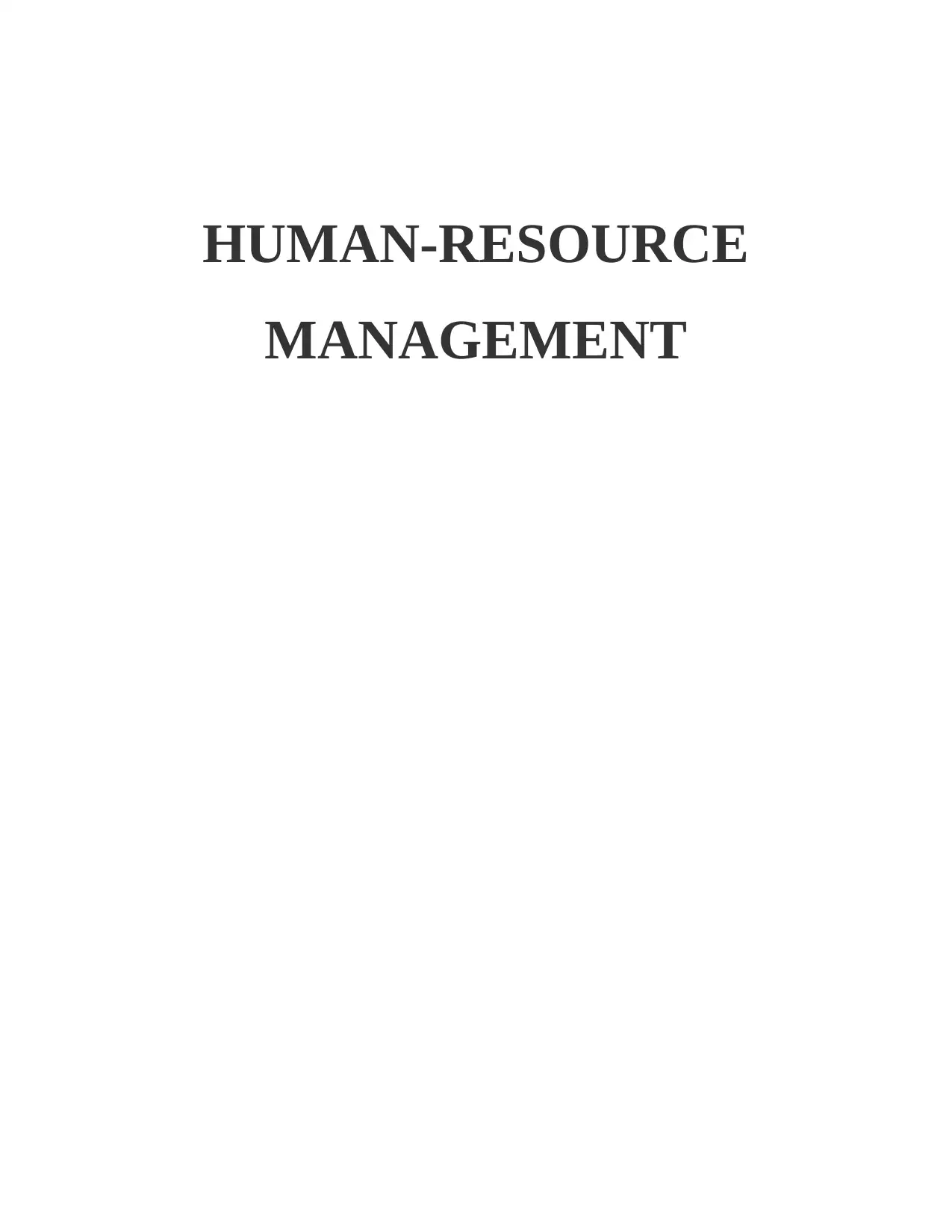
HUMAN-RESOURCE
MANAGEMENT
MANAGEMENT
Paraphrase This Document
Need a fresh take? Get an instant paraphrase of this document with our AI Paraphraser
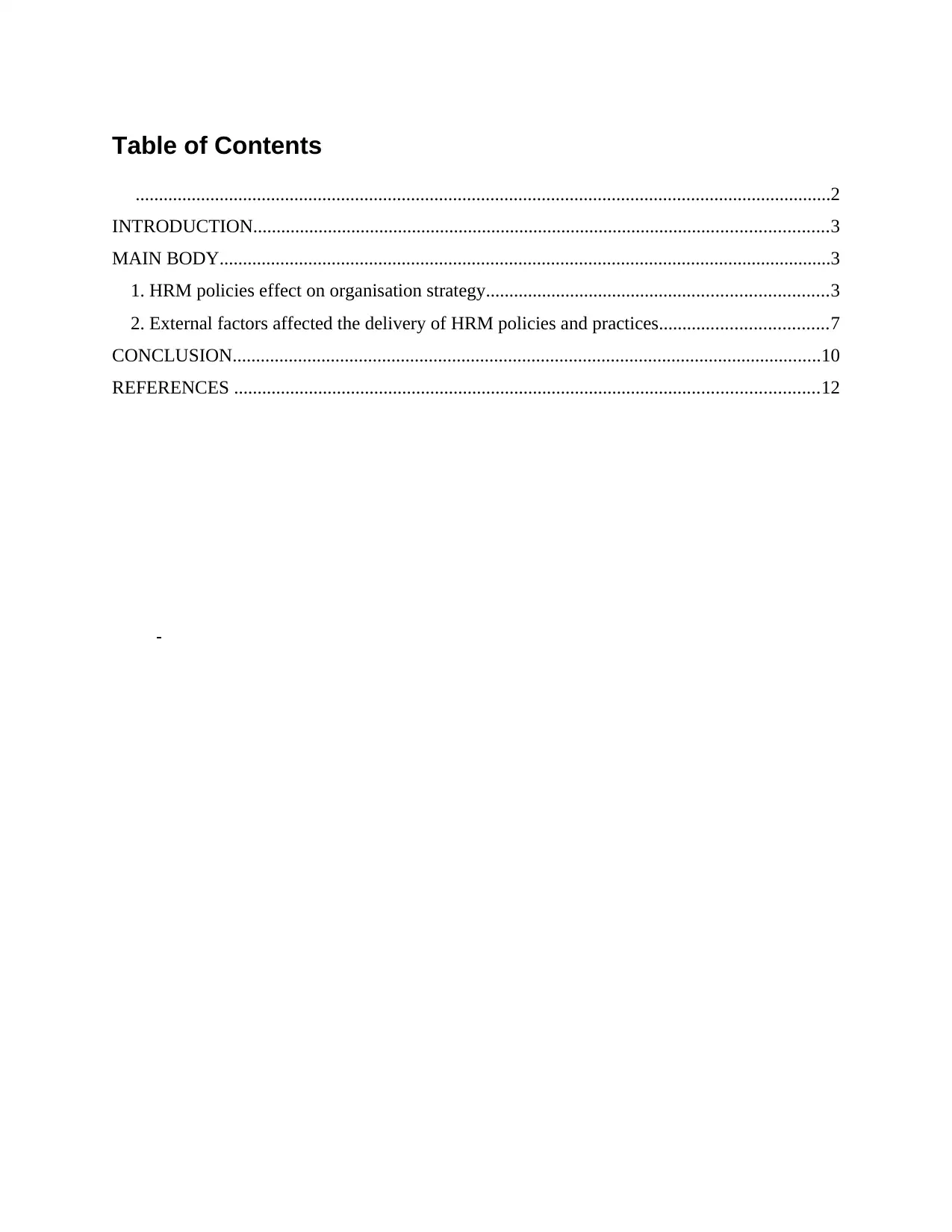
Table of Contents
.....................................................................................................................................................2
INTRODUCTION...........................................................................................................................3
MAIN BODY...................................................................................................................................3
1. HRM policies effect on organisation strategy.........................................................................3
2. External factors affected the delivery of HRM policies and practices....................................7
CONCLUSION..............................................................................................................................10
REFERENCES .............................................................................................................................12
.....................................................................................................................................................2
INTRODUCTION...........................................................................................................................3
MAIN BODY...................................................................................................................................3
1. HRM policies effect on organisation strategy.........................................................................3
2. External factors affected the delivery of HRM policies and practices....................................7
CONCLUSION..............................................................................................................................10
REFERENCES .............................................................................................................................12
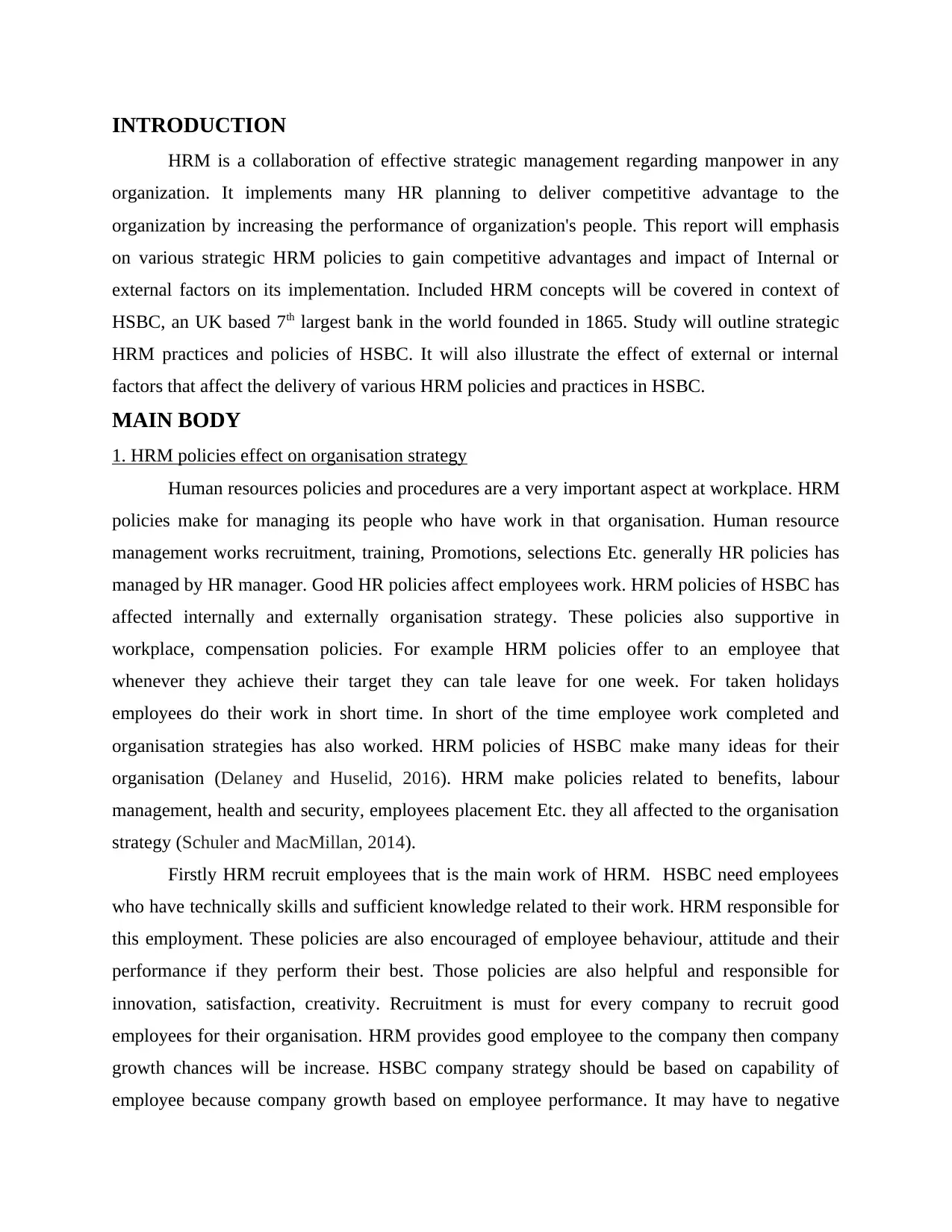
INTRODUCTION
HRM is a collaboration of effective strategic management regarding manpower in any
organization. It implements many HR planning to deliver competitive advantage to the
organization by increasing the performance of organization's people. This report will emphasis
on various strategic HRM policies to gain competitive advantages and impact of Internal or
external factors on its implementation. Included HRM concepts will be covered in context of
HSBC, an UK based 7th largest bank in the world founded in 1865. Study will outline strategic
HRM practices and policies of HSBC. It will also illustrate the effect of external or internal
factors that affect the delivery of various HRM policies and practices in HSBC.
MAIN BODY
1. HRM policies effect on organisation strategy
Human resources policies and procedures are a very important aspect at workplace. HRM
policies make for managing its people who have work in that organisation. Human resource
management works recruitment, training, Promotions, selections Etc. generally HR policies has
managed by HR manager. Good HR policies affect employees work. HRM policies of HSBC has
affected internally and externally organisation strategy. These policies also supportive in
workplace, compensation policies. For example HRM policies offer to an employee that
whenever they achieve their target they can tale leave for one week. For taken holidays
employees do their work in short time. In short of the time employee work completed and
organisation strategies has also worked. HRM policies of HSBC make many ideas for their
organisation (Delaney and Huselid, 2016). HRM make policies related to benefits, labour
management, health and security, employees placement Etc. they all affected to the organisation
strategy (Schuler and MacMillan, 2014).
Firstly HRM recruit employees that is the main work of HRM. HSBC need employees
who have technically skills and sufficient knowledge related to their work. HRM responsible for
this employment. These policies are also encouraged of employee behaviour, attitude and their
performance if they perform their best. Those policies are also helpful and responsible for
innovation, satisfaction, creativity. Recruitment is must for every company to recruit good
employees for their organisation. HRM provides good employee to the company then company
growth chances will be increase. HSBC company strategy should be based on capability of
employee because company growth based on employee performance. It may have to negative
HRM is a collaboration of effective strategic management regarding manpower in any
organization. It implements many HR planning to deliver competitive advantage to the
organization by increasing the performance of organization's people. This report will emphasis
on various strategic HRM policies to gain competitive advantages and impact of Internal or
external factors on its implementation. Included HRM concepts will be covered in context of
HSBC, an UK based 7th largest bank in the world founded in 1865. Study will outline strategic
HRM practices and policies of HSBC. It will also illustrate the effect of external or internal
factors that affect the delivery of various HRM policies and practices in HSBC.
MAIN BODY
1. HRM policies effect on organisation strategy
Human resources policies and procedures are a very important aspect at workplace. HRM
policies make for managing its people who have work in that organisation. Human resource
management works recruitment, training, Promotions, selections Etc. generally HR policies has
managed by HR manager. Good HR policies affect employees work. HRM policies of HSBC has
affected internally and externally organisation strategy. These policies also supportive in
workplace, compensation policies. For example HRM policies offer to an employee that
whenever they achieve their target they can tale leave for one week. For taken holidays
employees do their work in short time. In short of the time employee work completed and
organisation strategies has also worked. HRM policies of HSBC make many ideas for their
organisation (Delaney and Huselid, 2016). HRM make policies related to benefits, labour
management, health and security, employees placement Etc. they all affected to the organisation
strategy (Schuler and MacMillan, 2014).
Firstly HRM recruit employees that is the main work of HRM. HSBC need employees
who have technically skills and sufficient knowledge related to their work. HRM responsible for
this employment. These policies are also encouraged of employee behaviour, attitude and their
performance if they perform their best. Those policies are also helpful and responsible for
innovation, satisfaction, creativity. Recruitment is must for every company to recruit good
employees for their organisation. HRM provides good employee to the company then company
growth chances will be increase. HSBC company strategy should be based on capability of
employee because company growth based on employee performance. It may have to negative
⊘ This is a preview!⊘
Do you want full access?
Subscribe today to unlock all pages.

Trusted by 1+ million students worldwide
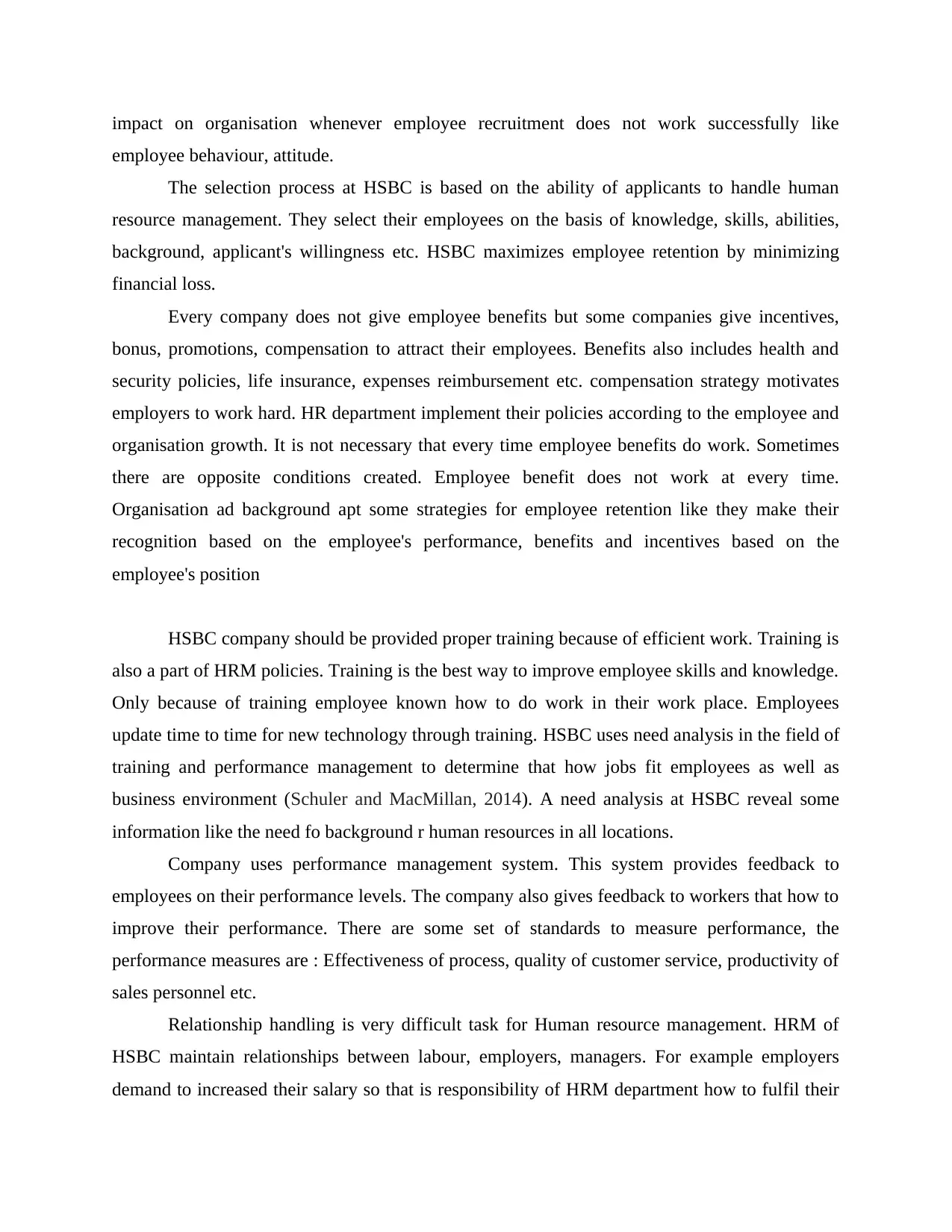
impact on organisation whenever employee recruitment does not work successfully like
employee behaviour, attitude.
The selection process at HSBC is based on the ability of applicants to handle human
resource management. They select their employees on the basis of knowledge, skills, abilities,
background, applicant's willingness etc. HSBC maximizes employee retention by minimizing
financial loss.
Every company does not give employee benefits but some companies give incentives,
bonus, promotions, compensation to attract their employees. Benefits also includes health and
security policies, life insurance, expenses reimbursement etc. compensation strategy motivates
employers to work hard. HR department implement their policies according to the employee and
organisation growth. It is not necessary that every time employee benefits do work. Sometimes
there are opposite conditions created. Employee benefit does not work at every time.
Organisation ad background apt some strategies for employee retention like they make their
recognition based on the employee's performance, benefits and incentives based on the
employee's position
HSBC company should be provided proper training because of efficient work. Training is
also a part of HRM policies. Training is the best way to improve employee skills and knowledge.
Only because of training employee known how to do work in their work place. Employees
update time to time for new technology through training. HSBC uses need analysis in the field of
training and performance management to determine that how jobs fit employees as well as
business environment (Schuler and MacMillan, 2014). A need analysis at HSBC reveal some
information like the need fo background r human resources in all locations.
Company uses performance management system. This system provides feedback to
employees on their performance levels. The company also gives feedback to workers that how to
improve their performance. There are some set of standards to measure performance, the
performance measures are : Effectiveness of process, quality of customer service, productivity of
sales personnel etc.
Relationship handling is very difficult task for Human resource management. HRM of
HSBC maintain relationships between labour, employers, managers. For example employers
demand to increased their salary so that is responsibility of HRM department how to fulfil their
employee behaviour, attitude.
The selection process at HSBC is based on the ability of applicants to handle human
resource management. They select their employees on the basis of knowledge, skills, abilities,
background, applicant's willingness etc. HSBC maximizes employee retention by minimizing
financial loss.
Every company does not give employee benefits but some companies give incentives,
bonus, promotions, compensation to attract their employees. Benefits also includes health and
security policies, life insurance, expenses reimbursement etc. compensation strategy motivates
employers to work hard. HR department implement their policies according to the employee and
organisation growth. It is not necessary that every time employee benefits do work. Sometimes
there are opposite conditions created. Employee benefit does not work at every time.
Organisation ad background apt some strategies for employee retention like they make their
recognition based on the employee's performance, benefits and incentives based on the
employee's position
HSBC company should be provided proper training because of efficient work. Training is
also a part of HRM policies. Training is the best way to improve employee skills and knowledge.
Only because of training employee known how to do work in their work place. Employees
update time to time for new technology through training. HSBC uses need analysis in the field of
training and performance management to determine that how jobs fit employees as well as
business environment (Schuler and MacMillan, 2014). A need analysis at HSBC reveal some
information like the need fo background r human resources in all locations.
Company uses performance management system. This system provides feedback to
employees on their performance levels. The company also gives feedback to workers that how to
improve their performance. There are some set of standards to measure performance, the
performance measures are : Effectiveness of process, quality of customer service, productivity of
sales personnel etc.
Relationship handling is very difficult task for Human resource management. HRM of
HSBC maintain relationships between labour, employers, managers. For example employers
demand to increased their salary so that is responsibility of HRM department how to fulfil their
Paraphrase This Document
Need a fresh take? Get an instant paraphrase of this document with our AI Paraphraser
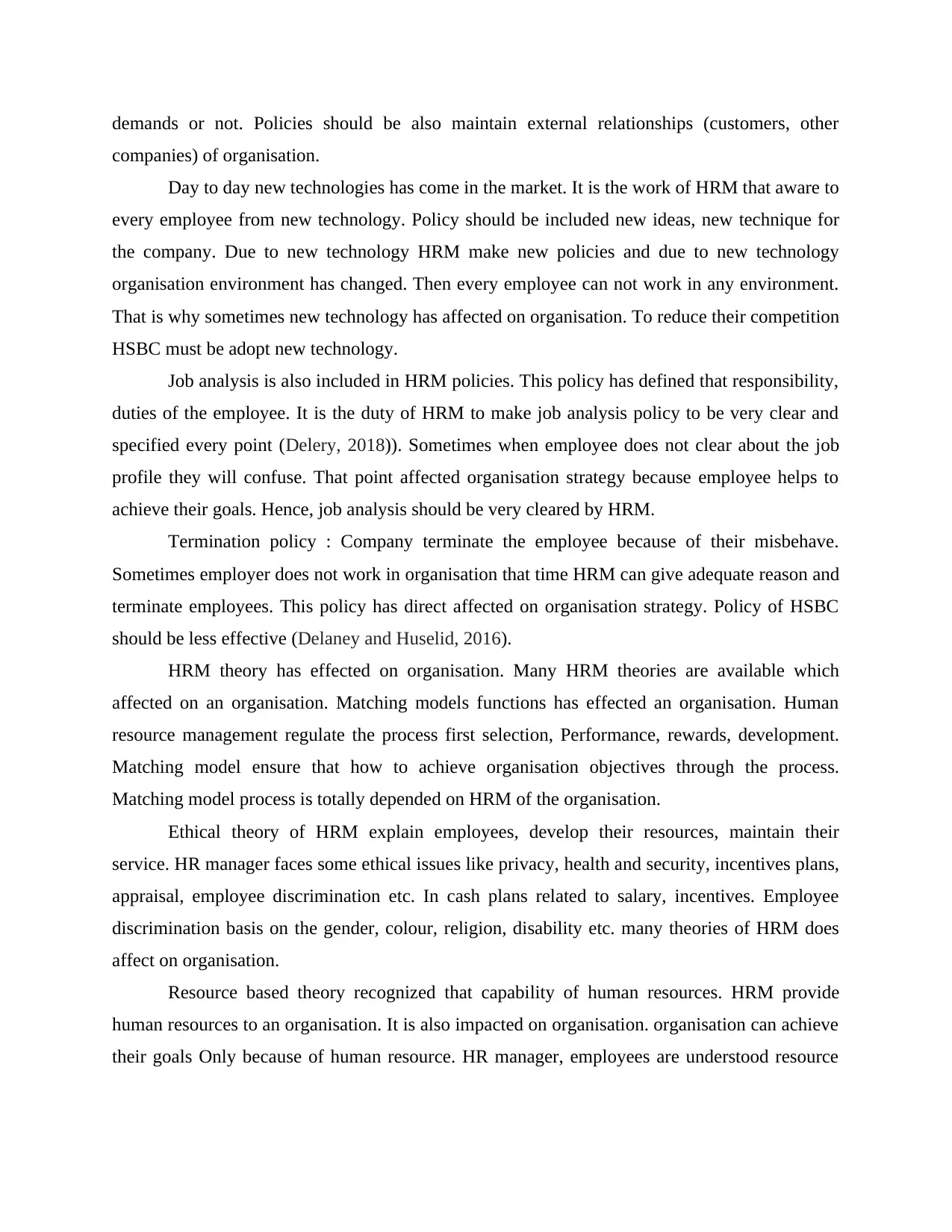
demands or not. Policies should be also maintain external relationships (customers, other
companies) of organisation.
Day to day new technologies has come in the market. It is the work of HRM that aware to
every employee from new technology. Policy should be included new ideas, new technique for
the company. Due to new technology HRM make new policies and due to new technology
organisation environment has changed. Then every employee can not work in any environment.
That is why sometimes new technology has affected on organisation. To reduce their competition
HSBC must be adopt new technology.
Job analysis is also included in HRM policies. This policy has defined that responsibility,
duties of the employee. It is the duty of HRM to make job analysis policy to be very clear and
specified every point (Delery, 2018)). Sometimes when employee does not clear about the job
profile they will confuse. That point affected organisation strategy because employee helps to
achieve their goals. Hence, job analysis should be very cleared by HRM.
Termination policy : Company terminate the employee because of their misbehave.
Sometimes employer does not work in organisation that time HRM can give adequate reason and
terminate employees. This policy has direct affected on organisation strategy. Policy of HSBC
should be less effective (Delaney and Huselid, 2016).
HRM theory has effected on organisation. Many HRM theories are available which
affected on an organisation. Matching models functions has effected an organisation. Human
resource management regulate the process first selection, Performance, rewards, development.
Matching model ensure that how to achieve organisation objectives through the process.
Matching model process is totally depended on HRM of the organisation.
Ethical theory of HRM explain employees, develop their resources, maintain their
service. HR manager faces some ethical issues like privacy, health and security, incentives plans,
appraisal, employee discrimination etc. In cash plans related to salary, incentives. Employee
discrimination basis on the gender, colour, religion, disability etc. many theories of HRM does
affect on organisation.
Resource based theory recognized that capability of human resources. HRM provide
human resources to an organisation. It is also impacted on organisation. organisation can achieve
their goals Only because of human resource. HR manager, employees are understood resource
companies) of organisation.
Day to day new technologies has come in the market. It is the work of HRM that aware to
every employee from new technology. Policy should be included new ideas, new technique for
the company. Due to new technology HRM make new policies and due to new technology
organisation environment has changed. Then every employee can not work in any environment.
That is why sometimes new technology has affected on organisation. To reduce their competition
HSBC must be adopt new technology.
Job analysis is also included in HRM policies. This policy has defined that responsibility,
duties of the employee. It is the duty of HRM to make job analysis policy to be very clear and
specified every point (Delery, 2018)). Sometimes when employee does not clear about the job
profile they will confuse. That point affected organisation strategy because employee helps to
achieve their goals. Hence, job analysis should be very cleared by HRM.
Termination policy : Company terminate the employee because of their misbehave.
Sometimes employer does not work in organisation that time HRM can give adequate reason and
terminate employees. This policy has direct affected on organisation strategy. Policy of HSBC
should be less effective (Delaney and Huselid, 2016).
HRM theory has effected on organisation. Many HRM theories are available which
affected on an organisation. Matching models functions has effected an organisation. Human
resource management regulate the process first selection, Performance, rewards, development.
Matching model ensure that how to achieve organisation objectives through the process.
Matching model process is totally depended on HRM of the organisation.
Ethical theory of HRM explain employees, develop their resources, maintain their
service. HR manager faces some ethical issues like privacy, health and security, incentives plans,
appraisal, employee discrimination etc. In cash plans related to salary, incentives. Employee
discrimination basis on the gender, colour, religion, disability etc. many theories of HRM does
affect on organisation.
Resource based theory recognized that capability of human resources. HRM provide
human resources to an organisation. It is also impacted on organisation. organisation can achieve
their goals Only because of human resource. HR manager, employees are understood resource
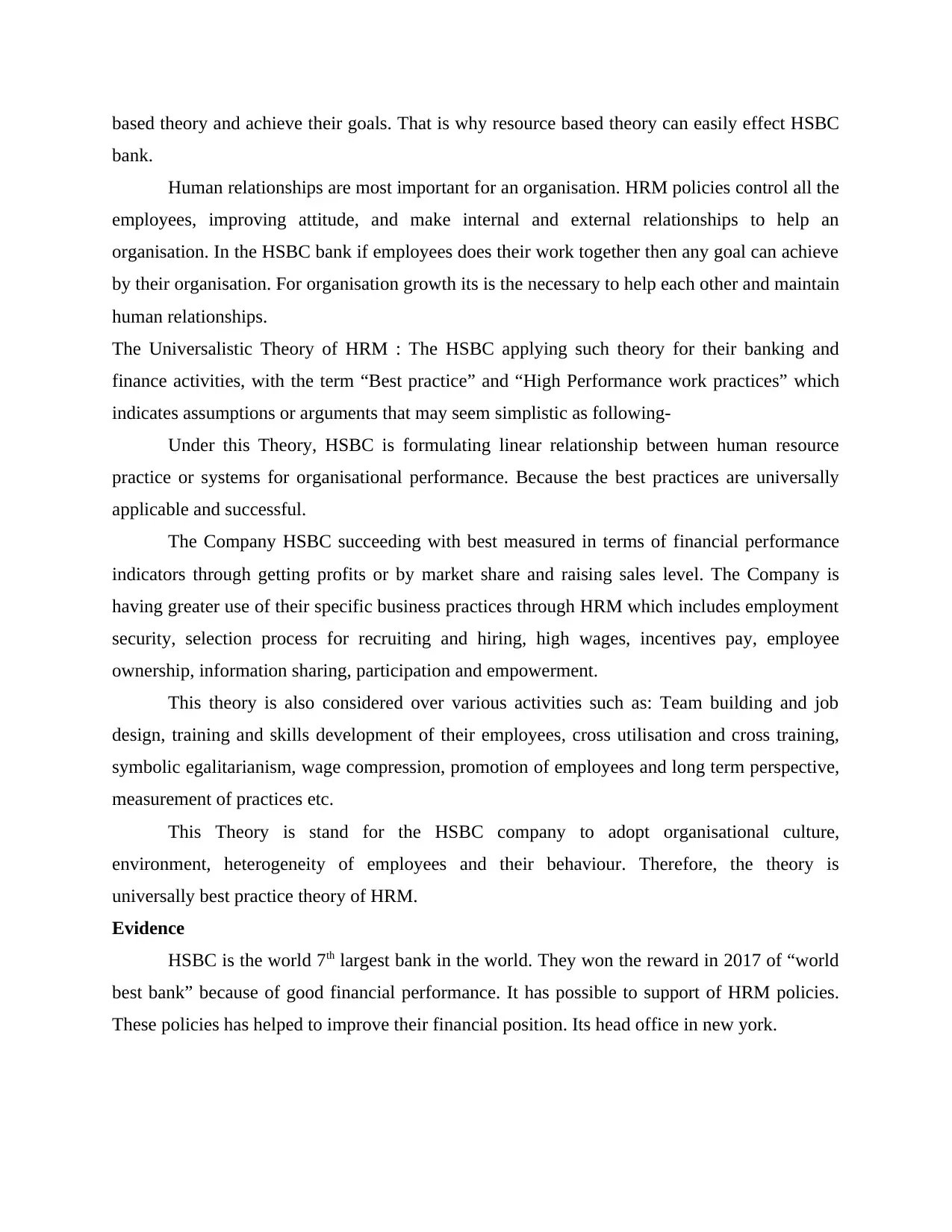
based theory and achieve their goals. That is why resource based theory can easily effect HSBC
bank.
Human relationships are most important for an organisation. HRM policies control all the
employees, improving attitude, and make internal and external relationships to help an
organisation. In the HSBC bank if employees does their work together then any goal can achieve
by their organisation. For organisation growth its is the necessary to help each other and maintain
human relationships.
The Universalistic Theory of HRM : The HSBC applying such theory for their banking and
finance activities, with the term “Best practice” and “High Performance work practices” which
indicates assumptions or arguments that may seem simplistic as following-
Under this Theory, HSBC is formulating linear relationship between human resource
practice or systems for organisational performance. Because the best practices are universally
applicable and successful.
The Company HSBC succeeding with best measured in terms of financial performance
indicators through getting profits or by market share and raising sales level. The Company is
having greater use of their specific business practices through HRM which includes employment
security, selection process for recruiting and hiring, high wages, incentives pay, employee
ownership, information sharing, participation and empowerment.
This theory is also considered over various activities such as: Team building and job
design, training and skills development of their employees, cross utilisation and cross training,
symbolic egalitarianism, wage compression, promotion of employees and long term perspective,
measurement of practices etc.
This Theory is stand for the HSBC company to adopt organisational culture,
environment, heterogeneity of employees and their behaviour. Therefore, the theory is
universally best practice theory of HRM.
Evidence
HSBC is the world 7th largest bank in the world. They won the reward in 2017 of “world
best bank” because of good financial performance. It has possible to support of HRM policies.
These policies has helped to improve their financial position. Its head office in new york.
bank.
Human relationships are most important for an organisation. HRM policies control all the
employees, improving attitude, and make internal and external relationships to help an
organisation. In the HSBC bank if employees does their work together then any goal can achieve
by their organisation. For organisation growth its is the necessary to help each other and maintain
human relationships.
The Universalistic Theory of HRM : The HSBC applying such theory for their banking and
finance activities, with the term “Best practice” and “High Performance work practices” which
indicates assumptions or arguments that may seem simplistic as following-
Under this Theory, HSBC is formulating linear relationship between human resource
practice or systems for organisational performance. Because the best practices are universally
applicable and successful.
The Company HSBC succeeding with best measured in terms of financial performance
indicators through getting profits or by market share and raising sales level. The Company is
having greater use of their specific business practices through HRM which includes employment
security, selection process for recruiting and hiring, high wages, incentives pay, employee
ownership, information sharing, participation and empowerment.
This theory is also considered over various activities such as: Team building and job
design, training and skills development of their employees, cross utilisation and cross training,
symbolic egalitarianism, wage compression, promotion of employees and long term perspective,
measurement of practices etc.
This Theory is stand for the HSBC company to adopt organisational culture,
environment, heterogeneity of employees and their behaviour. Therefore, the theory is
universally best practice theory of HRM.
Evidence
HSBC is the world 7th largest bank in the world. They won the reward in 2017 of “world
best bank” because of good financial performance. It has possible to support of HRM policies.
These policies has helped to improve their financial position. Its head office in new york.
⊘ This is a preview!⊘
Do you want full access?
Subscribe today to unlock all pages.

Trusted by 1+ million students worldwide
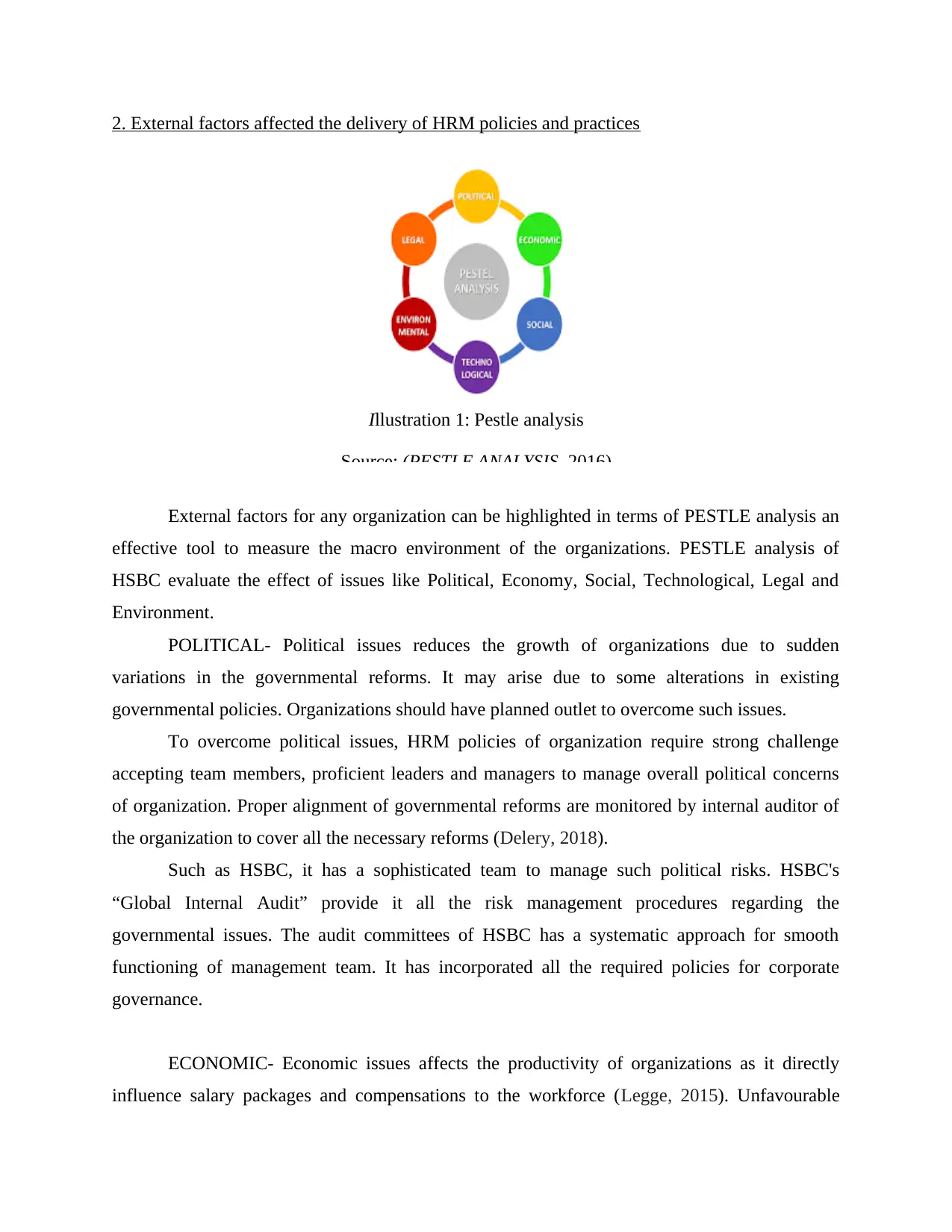
2. External factors affected the delivery of HRM policies and practices
External factors for any organization can be highlighted in terms of PESTLE analysis an
effective tool to measure the macro environment of the organizations. PESTLE analysis of
HSBC evaluate the effect of issues like Political, Economy, Social, Technological, Legal and
Environment.
POLITICAL- Political issues reduces the growth of organizations due to sudden
variations in the governmental reforms. It may arise due to some alterations in existing
governmental policies. Organizations should have planned outlet to overcome such issues.
To overcome political issues, HRM policies of organization require strong challenge
accepting team members, proficient leaders and managers to manage overall political concerns
of organization. Proper alignment of governmental reforms are monitored by internal auditor of
the organization to cover all the necessary reforms (Delery, 2018).
Such as HSBC, it has a sophisticated team to manage such political risks. HSBC's
“Global Internal Audit” provide it all the risk management procedures regarding the
governmental issues. The audit committees of HSBC has a systematic approach for smooth
functioning of management team. It has incorporated all the required policies for corporate
governance.
ECONOMIC- Economic issues affects the productivity of organizations as it directly
influence salary packages and compensations to the workforce (Legge, 2015). Unfavourable
Illustration 1: Pestle analysis
Source: (PESTLE ANALYSIS, 2016)
External factors for any organization can be highlighted in terms of PESTLE analysis an
effective tool to measure the macro environment of the organizations. PESTLE analysis of
HSBC evaluate the effect of issues like Political, Economy, Social, Technological, Legal and
Environment.
POLITICAL- Political issues reduces the growth of organizations due to sudden
variations in the governmental reforms. It may arise due to some alterations in existing
governmental policies. Organizations should have planned outlet to overcome such issues.
To overcome political issues, HRM policies of organization require strong challenge
accepting team members, proficient leaders and managers to manage overall political concerns
of organization. Proper alignment of governmental reforms are monitored by internal auditor of
the organization to cover all the necessary reforms (Delery, 2018).
Such as HSBC, it has a sophisticated team to manage such political risks. HSBC's
“Global Internal Audit” provide it all the risk management procedures regarding the
governmental issues. The audit committees of HSBC has a systematic approach for smooth
functioning of management team. It has incorporated all the required policies for corporate
governance.
ECONOMIC- Economic issues affects the productivity of organizations as it directly
influence salary packages and compensations to the workforce (Legge, 2015). Unfavourable
Illustration 1: Pestle analysis
Source: (PESTLE ANALYSIS, 2016)
Paraphrase This Document
Need a fresh take? Get an instant paraphrase of this document with our AI Paraphraser
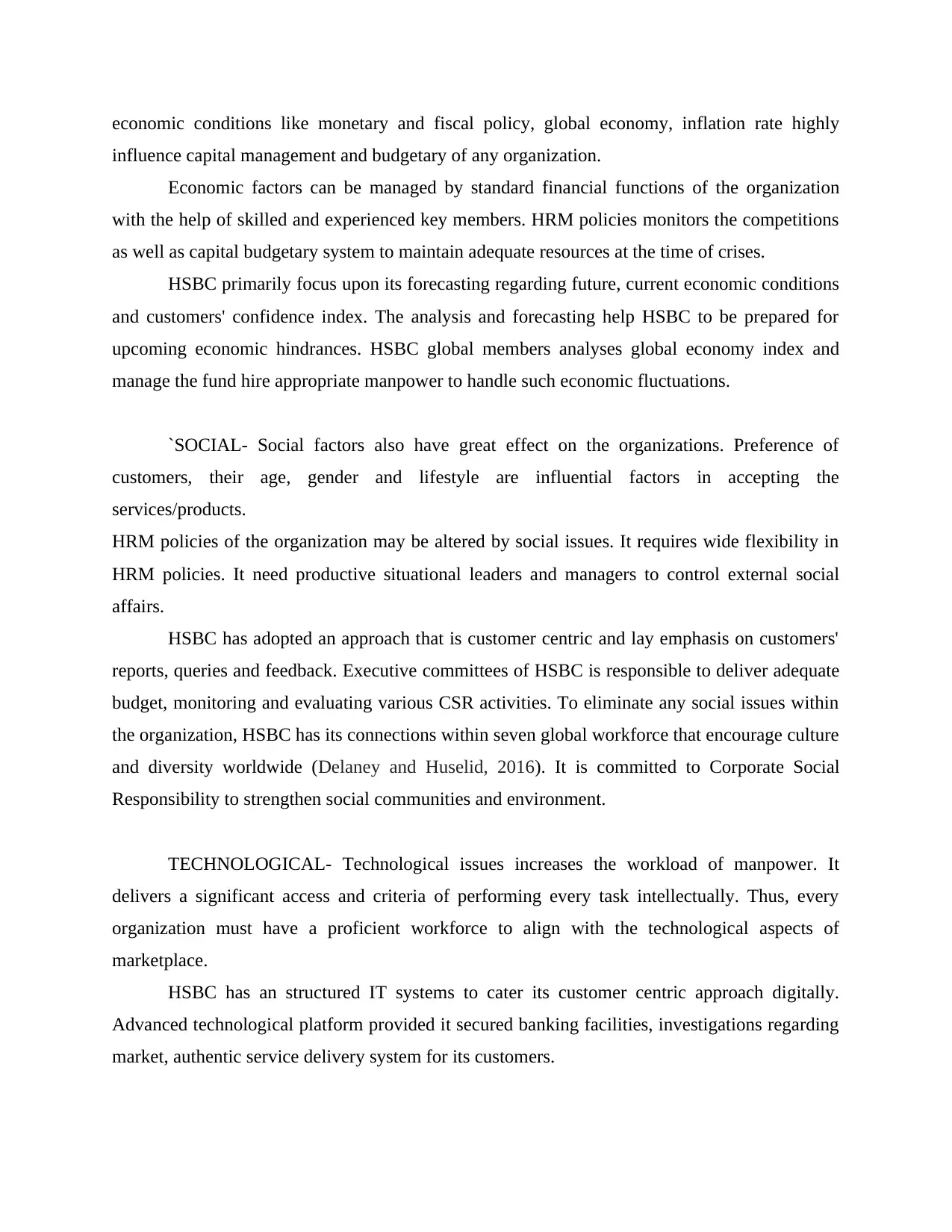
economic conditions like monetary and fiscal policy, global economy, inflation rate highly
influence capital management and budgetary of any organization.
Economic factors can be managed by standard financial functions of the organization
with the help of skilled and experienced key members. HRM policies monitors the competitions
as well as capital budgetary system to maintain adequate resources at the time of crises.
HSBC primarily focus upon its forecasting regarding future, current economic conditions
and customers' confidence index. The analysis and forecasting help HSBC to be prepared for
upcoming economic hindrances. HSBC global members analyses global economy index and
manage the fund hire appropriate manpower to handle such economic fluctuations.
`SOCIAL- Social factors also have great effect on the organizations. Preference of
customers, their age, gender and lifestyle are influential factors in accepting the
services/products.
HRM policies of the organization may be altered by social issues. It requires wide flexibility in
HRM policies. It need productive situational leaders and managers to control external social
affairs.
HSBC has adopted an approach that is customer centric and lay emphasis on customers'
reports, queries and feedback. Executive committees of HSBC is responsible to deliver adequate
budget, monitoring and evaluating various CSR activities. To eliminate any social issues within
the organization, HSBC has its connections within seven global workforce that encourage culture
and diversity worldwide (Delaney and Huselid, 2016). It is committed to Corporate Social
Responsibility to strengthen social communities and environment.
TECHNOLOGICAL- Technological issues increases the workload of manpower. It
delivers a significant access and criteria of performing every task intellectually. Thus, every
organization must have a proficient workforce to align with the technological aspects of
marketplace.
HSBC has an structured IT systems to cater its customer centric approach digitally.
Advanced technological platform provided it secured banking facilities, investigations regarding
market, authentic service delivery system for its customers.
influence capital management and budgetary of any organization.
Economic factors can be managed by standard financial functions of the organization
with the help of skilled and experienced key members. HRM policies monitors the competitions
as well as capital budgetary system to maintain adequate resources at the time of crises.
HSBC primarily focus upon its forecasting regarding future, current economic conditions
and customers' confidence index. The analysis and forecasting help HSBC to be prepared for
upcoming economic hindrances. HSBC global members analyses global economy index and
manage the fund hire appropriate manpower to handle such economic fluctuations.
`SOCIAL- Social factors also have great effect on the organizations. Preference of
customers, their age, gender and lifestyle are influential factors in accepting the
services/products.
HRM policies of the organization may be altered by social issues. It requires wide flexibility in
HRM policies. It need productive situational leaders and managers to control external social
affairs.
HSBC has adopted an approach that is customer centric and lay emphasis on customers'
reports, queries and feedback. Executive committees of HSBC is responsible to deliver adequate
budget, monitoring and evaluating various CSR activities. To eliminate any social issues within
the organization, HSBC has its connections within seven global workforce that encourage culture
and diversity worldwide (Delaney and Huselid, 2016). It is committed to Corporate Social
Responsibility to strengthen social communities and environment.
TECHNOLOGICAL- Technological issues increases the workload of manpower. It
delivers a significant access and criteria of performing every task intellectually. Thus, every
organization must have a proficient workforce to align with the technological aspects of
marketplace.
HSBC has an structured IT systems to cater its customer centric approach digitally.
Advanced technological platform provided it secured banking facilities, investigations regarding
market, authentic service delivery system for its customers.
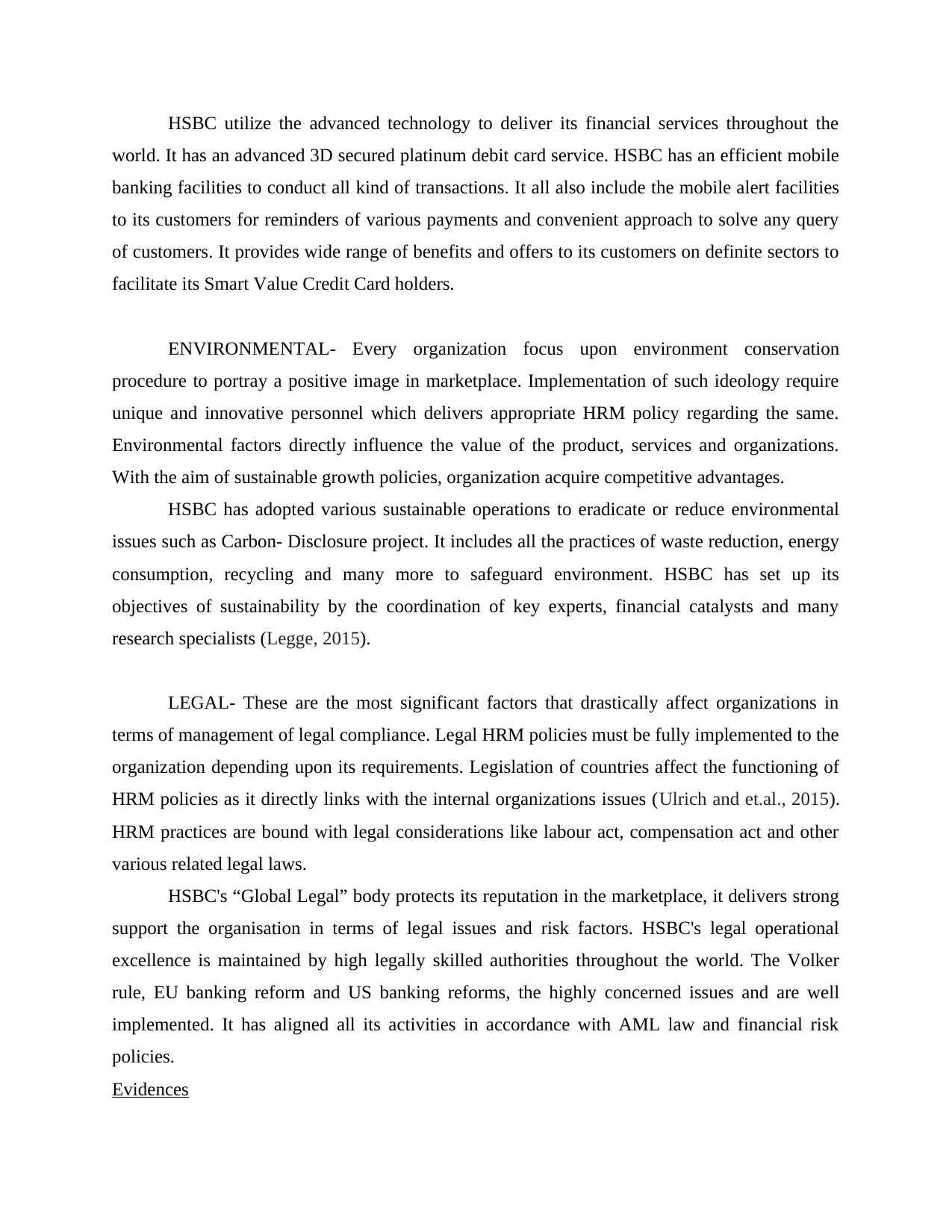
HSBC utilize the advanced technology to deliver its financial services throughout the
world. It has an advanced 3D secured platinum debit card service. HSBC has an efficient mobile
banking facilities to conduct all kind of transactions. It all also include the mobile alert facilities
to its customers for reminders of various payments and convenient approach to solve any query
of customers. It provides wide range of benefits and offers to its customers on definite sectors to
facilitate its Smart Value Credit Card holders.
ENVIRONMENTAL- Every organization focus upon environment conservation
procedure to portray a positive image in marketplace. Implementation of such ideology require
unique and innovative personnel which delivers appropriate HRM policy regarding the same.
Environmental factors directly influence the value of the product, services and organizations.
With the aim of sustainable growth policies, organization acquire competitive advantages.
HSBC has adopted various sustainable operations to eradicate or reduce environmental
issues such as Carbon- Disclosure project. It includes all the practices of waste reduction, energy
consumption, recycling and many more to safeguard environment. HSBC has set up its
objectives of sustainability by the coordination of key experts, financial catalysts and many
research specialists (Legge, 2015).
LEGAL- These are the most significant factors that drastically affect organizations in
terms of management of legal compliance. Legal HRM policies must be fully implemented to the
organization depending upon its requirements. Legislation of countries affect the functioning of
HRM policies as it directly links with the internal organizations issues (Ulrich and et.al., 2015).
HRM practices are bound with legal considerations like labour act, compensation act and other
various related legal laws.
HSBC's “Global Legal” body protects its reputation in the marketplace, it delivers strong
support the organisation in terms of legal issues and risk factors. HSBC's legal operational
excellence is maintained by high legally skilled authorities throughout the world. The Volker
rule, EU banking reform and US banking reforms, the highly concerned issues and are well
implemented. It has aligned all its activities in accordance with AML law and financial risk
policies.
Evidences
world. It has an advanced 3D secured platinum debit card service. HSBC has an efficient mobile
banking facilities to conduct all kind of transactions. It all also include the mobile alert facilities
to its customers for reminders of various payments and convenient approach to solve any query
of customers. It provides wide range of benefits and offers to its customers on definite sectors to
facilitate its Smart Value Credit Card holders.
ENVIRONMENTAL- Every organization focus upon environment conservation
procedure to portray a positive image in marketplace. Implementation of such ideology require
unique and innovative personnel which delivers appropriate HRM policy regarding the same.
Environmental factors directly influence the value of the product, services and organizations.
With the aim of sustainable growth policies, organization acquire competitive advantages.
HSBC has adopted various sustainable operations to eradicate or reduce environmental
issues such as Carbon- Disclosure project. It includes all the practices of waste reduction, energy
consumption, recycling and many more to safeguard environment. HSBC has set up its
objectives of sustainability by the coordination of key experts, financial catalysts and many
research specialists (Legge, 2015).
LEGAL- These are the most significant factors that drastically affect organizations in
terms of management of legal compliance. Legal HRM policies must be fully implemented to the
organization depending upon its requirements. Legislation of countries affect the functioning of
HRM policies as it directly links with the internal organizations issues (Ulrich and et.al., 2015).
HRM practices are bound with legal considerations like labour act, compensation act and other
various related legal laws.
HSBC's “Global Legal” body protects its reputation in the marketplace, it delivers strong
support the organisation in terms of legal issues and risk factors. HSBC's legal operational
excellence is maintained by high legally skilled authorities throughout the world. The Volker
rule, EU banking reform and US banking reforms, the highly concerned issues and are well
implemented. It has aligned all its activities in accordance with AML law and financial risk
policies.
Evidences
⊘ This is a preview!⊘
Do you want full access?
Subscribe today to unlock all pages.

Trusted by 1+ million students worldwide
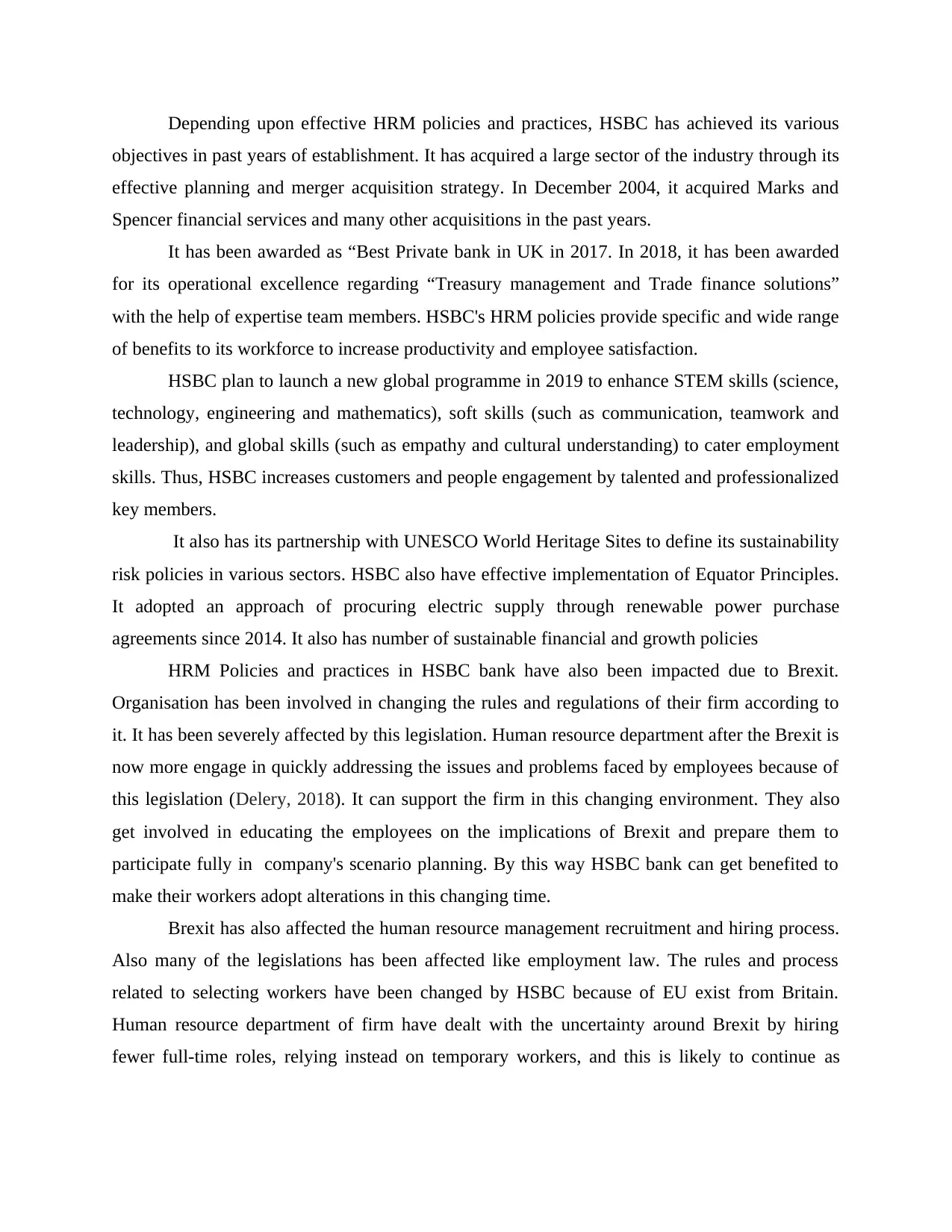
Depending upon effective HRM policies and practices, HSBC has achieved its various
objectives in past years of establishment. It has acquired a large sector of the industry through its
effective planning and merger acquisition strategy. In December 2004, it acquired Marks and
Spencer financial services and many other acquisitions in the past years.
It has been awarded as “Best Private bank in UK in 2017. In 2018, it has been awarded
for its operational excellence regarding “Treasury management and Trade finance solutions”
with the help of expertise team members. HSBC's HRM policies provide specific and wide range
of benefits to its workforce to increase productivity and employee satisfaction.
HSBC plan to launch a new global programme in 2019 to enhance STEM skills (science,
technology, engineering and mathematics), soft skills (such as communication, teamwork and
leadership), and global skills (such as empathy and cultural understanding) to cater employment
skills. Thus, HSBC increases customers and people engagement by talented and professionalized
key members.
It also has its partnership with UNESCO World Heritage Sites to define its sustainability
risk policies in various sectors. HSBC also have effective implementation of Equator Principles.
It adopted an approach of procuring electric supply through renewable power purchase
agreements since 2014. It also has number of sustainable financial and growth policies
HRM Policies and practices in HSBC bank have also been impacted due to Brexit.
Organisation has been involved in changing the rules and regulations of their firm according to
it. It has been severely affected by this legislation. Human resource department after the Brexit is
now more engage in quickly addressing the issues and problems faced by employees because of
this legislation (Delery, 2018). It can support the firm in this changing environment. They also
get involved in educating the employees on the implications of Brexit and prepare them to
participate fully in company's scenario planning. By this way HSBC bank can get benefited to
make their workers adopt alterations in this changing time.
Brexit has also affected the human resource management recruitment and hiring process.
Also many of the legislations has been affected like employment law. The rules and process
related to selecting workers have been changed by HSBC because of EU exist from Britain.
Human resource department of firm have dealt with the uncertainty around Brexit by hiring
fewer full-time roles, relying instead on temporary workers, and this is likely to continue as
objectives in past years of establishment. It has acquired a large sector of the industry through its
effective planning and merger acquisition strategy. In December 2004, it acquired Marks and
Spencer financial services and many other acquisitions in the past years.
It has been awarded as “Best Private bank in UK in 2017. In 2018, it has been awarded
for its operational excellence regarding “Treasury management and Trade finance solutions”
with the help of expertise team members. HSBC's HRM policies provide specific and wide range
of benefits to its workforce to increase productivity and employee satisfaction.
HSBC plan to launch a new global programme in 2019 to enhance STEM skills (science,
technology, engineering and mathematics), soft skills (such as communication, teamwork and
leadership), and global skills (such as empathy and cultural understanding) to cater employment
skills. Thus, HSBC increases customers and people engagement by talented and professionalized
key members.
It also has its partnership with UNESCO World Heritage Sites to define its sustainability
risk policies in various sectors. HSBC also have effective implementation of Equator Principles.
It adopted an approach of procuring electric supply through renewable power purchase
agreements since 2014. It also has number of sustainable financial and growth policies
HRM Policies and practices in HSBC bank have also been impacted due to Brexit.
Organisation has been involved in changing the rules and regulations of their firm according to
it. It has been severely affected by this legislation. Human resource department after the Brexit is
now more engage in quickly addressing the issues and problems faced by employees because of
this legislation (Delery, 2018). It can support the firm in this changing environment. They also
get involved in educating the employees on the implications of Brexit and prepare them to
participate fully in company's scenario planning. By this way HSBC bank can get benefited to
make their workers adopt alterations in this changing time.
Brexit has also affected the human resource management recruitment and hiring process.
Also many of the legislations has been affected like employment law. The rules and process
related to selecting workers have been changed by HSBC because of EU exist from Britain.
Human resource department of firm have dealt with the uncertainty around Brexit by hiring
fewer full-time roles, relying instead on temporary workers, and this is likely to continue as
Paraphrase This Document
Need a fresh take? Get an instant paraphrase of this document with our AI Paraphraser
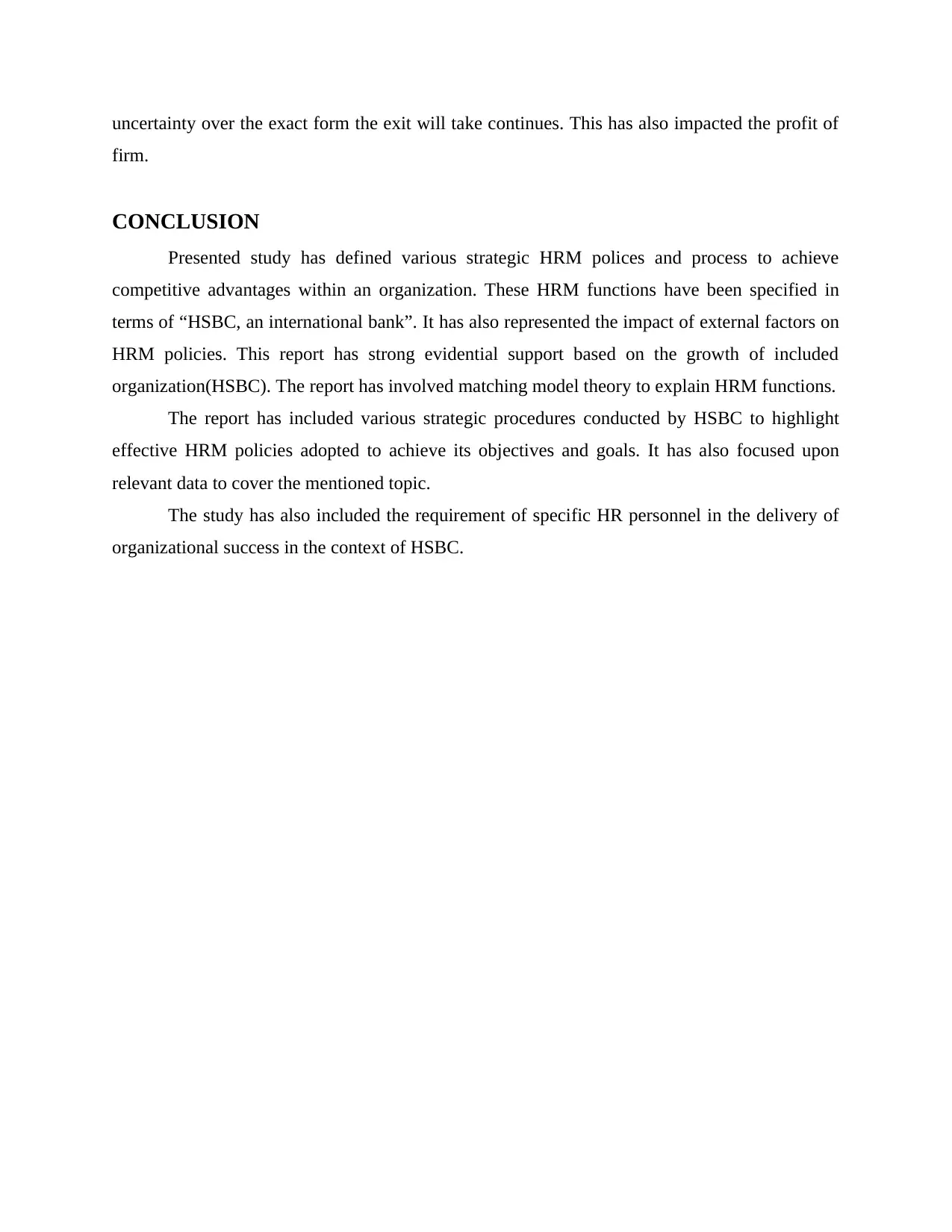
uncertainty over the exact form the exit will take continues. This has also impacted the profit of
firm.
CONCLUSION
Presented study has defined various strategic HRM polices and process to achieve
competitive advantages within an organization. These HRM functions have been specified in
terms of “HSBC, an international bank”. It has also represented the impact of external factors on
HRM policies. This report has strong evidential support based on the growth of included
organization(HSBC). The report has involved matching model theory to explain HRM functions.
The report has included various strategic procedures conducted by HSBC to highlight
effective HRM policies adopted to achieve its objectives and goals. It has also focused upon
relevant data to cover the mentioned topic.
The study has also included the requirement of specific HR personnel in the delivery of
organizational success in the context of HSBC.
firm.
CONCLUSION
Presented study has defined various strategic HRM polices and process to achieve
competitive advantages within an organization. These HRM functions have been specified in
terms of “HSBC, an international bank”. It has also represented the impact of external factors on
HRM policies. This report has strong evidential support based on the growth of included
organization(HSBC). The report has involved matching model theory to explain HRM functions.
The report has included various strategic procedures conducted by HSBC to highlight
effective HRM policies adopted to achieve its objectives and goals. It has also focused upon
relevant data to cover the mentioned topic.
The study has also included the requirement of specific HR personnel in the delivery of
organizational success in the context of HSBC.
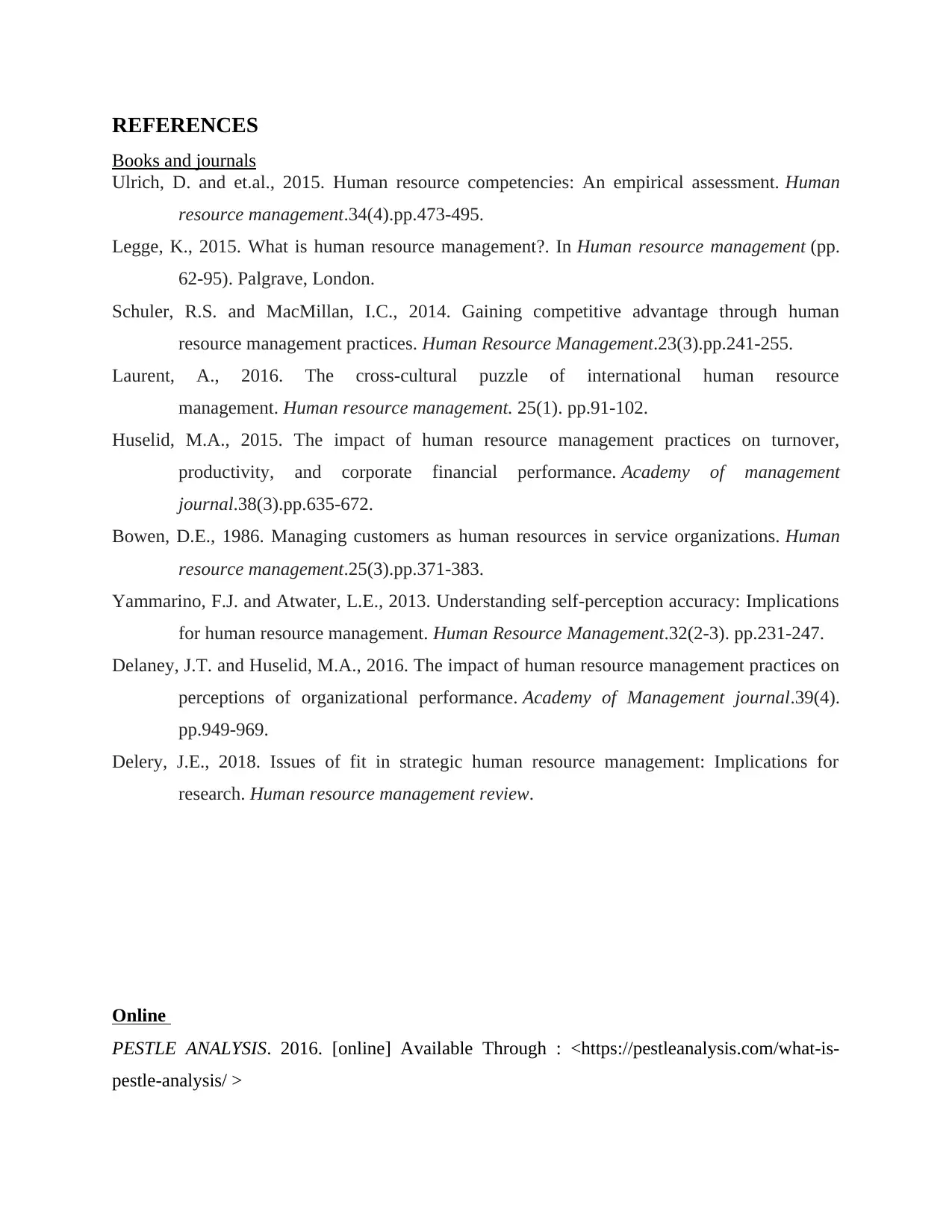
REFERENCES
Books and journals
Ulrich, D. and et.al., 2015. Human resource competencies: An empirical assessment. Human
resource management.34(4).pp.473-495.
Legge, K., 2015. What is human resource management?. In Human resource management (pp.
62-95). Palgrave, London.
Schuler, R.S. and MacMillan, I.C., 2014. Gaining competitive advantage through human
resource management practices. Human Resource Management.23(3).pp.241-255.
Laurent, A., 2016. The cross‐cultural puzzle of international human resource
management. Human resource management. 25(1). pp.91-102.
Huselid, M.A., 2015. The impact of human resource management practices on turnover,
productivity, and corporate financial performance. Academy of management
journal.38(3).pp.635-672.
Bowen, D.E., 1986. Managing customers as human resources in service organizations. Human
resource management.25(3).pp.371-383.
Yammarino, F.J. and Atwater, L.E., 2013. Understanding self‐perception accuracy: Implications
for human resource management. Human Resource Management.32(2‐3). pp.231-247.
Delaney, J.T. and Huselid, M.A., 2016. The impact of human resource management practices on
perceptions of organizational performance. Academy of Management journal.39(4).
pp.949-969.
Delery, J.E., 2018. Issues of fit in strategic human resource management: Implications for
research. Human resource management review.
Online
PESTLE ANALYSIS. 2016. [online] Available Through : <https://pestleanalysis.com/what-is-
pestle-analysis/ >
Books and journals
Ulrich, D. and et.al., 2015. Human resource competencies: An empirical assessment. Human
resource management.34(4).pp.473-495.
Legge, K., 2015. What is human resource management?. In Human resource management (pp.
62-95). Palgrave, London.
Schuler, R.S. and MacMillan, I.C., 2014. Gaining competitive advantage through human
resource management practices. Human Resource Management.23(3).pp.241-255.
Laurent, A., 2016. The cross‐cultural puzzle of international human resource
management. Human resource management. 25(1). pp.91-102.
Huselid, M.A., 2015. The impact of human resource management practices on turnover,
productivity, and corporate financial performance. Academy of management
journal.38(3).pp.635-672.
Bowen, D.E., 1986. Managing customers as human resources in service organizations. Human
resource management.25(3).pp.371-383.
Yammarino, F.J. and Atwater, L.E., 2013. Understanding self‐perception accuracy: Implications
for human resource management. Human Resource Management.32(2‐3). pp.231-247.
Delaney, J.T. and Huselid, M.A., 2016. The impact of human resource management practices on
perceptions of organizational performance. Academy of Management journal.39(4).
pp.949-969.
Delery, J.E., 2018. Issues of fit in strategic human resource management: Implications for
research. Human resource management review.
Online
PESTLE ANALYSIS. 2016. [online] Available Through : <https://pestleanalysis.com/what-is-
pestle-analysis/ >
⊘ This is a preview!⊘
Do you want full access?
Subscribe today to unlock all pages.

Trusted by 1+ million students worldwide
1 out of 13
Related Documents
Your All-in-One AI-Powered Toolkit for Academic Success.
+13062052269
info@desklib.com
Available 24*7 on WhatsApp / Email
![[object Object]](/_next/static/media/star-bottom.7253800d.svg)
Unlock your academic potential
Copyright © 2020–2026 A2Z Services. All Rights Reserved. Developed and managed by ZUCOL.





